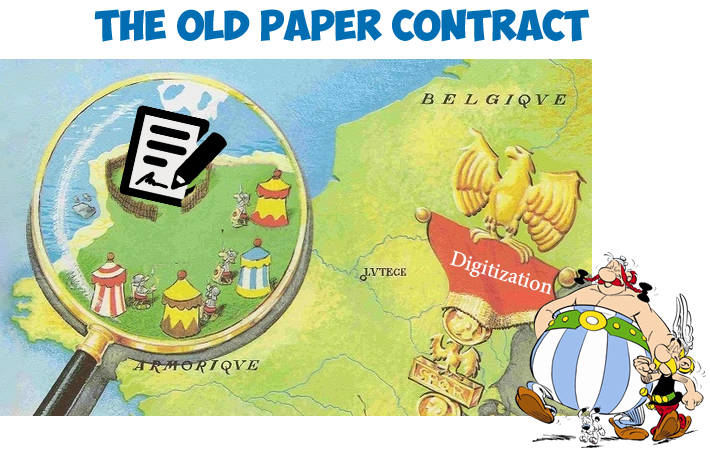The digitalization has transformed the way business is done in an unprecedented and impressive scale. Yet there is one small village that resisted…

Admittedly, it might feel somewhat unusual to sign a document on your smartphone or computer. This is despite the fact that it provides the same reliability and security as an analogue signature.
In this article we will therefore discuss why the paper contract is still used today and what will happen to your business if you digitize your contracts.
Why the digitalization won’t stop for paper contracts
The digital transformation has influenced the economic environment in a number of ways. It has given rise to new data-based business models, influenced customer expectation and fundamentally disrupted existing value chain logics.
So far so good… but why is this important for contracts?
Today, we live in a world of instant gratification. In the past, you had to walk to the store and buy CDs to get the newest music. Now, you’re just a click away. Looking for information? Just Google it. With one click, a car arrives within minutes via Uber.
We observe this phenomenon in all places and across all business functions. Some companies seem to driven by the ever increasing speed and agility. For example, today you can place an order on Amazon and the package arrives within two days. In the near future, it will arrive within minutes by drone.
What these trends have in common is that they all point towards the conceptually same thing. Easing and shortening the way to conversion.
Giving the customer the ability to convert without time lags is crucial. This is simply not possible with analogue contracts. Those need to be prepared, printed, send, signed, send back… This takes time and effort not to mention being costly.
So.. why are people still using paper contracts?
To answer this question let’s take a step back and briefly compare digital vs analogue contracts. Digital contracts, like almost all digital products, can be easily distributed and provide a multitude of additional benefits as compared to traditional contracts. One notable advantage is tracking of data. Companies that use digital products often have significantly more data and can therefore leverage analytics. What are your customers focusing on in the contract? How fast are they signing it? Do they open it once to sign or multiple times? Who else is reading this contract?
Getting these kinds of insights can provide numerous benefits to companies. After all, you’ve probably spend a lot of money to get to the stage where you’re able to send out contracts. Do you really want to have an “analogue blind spot” there?
Apart from tracking there are many other aspects which make digital contracts superior. For example, the delivery (or distribution) of the contract is simply much faster for digital contracts. Customers could therefore convert instantly on digital contracts.
Overall, the potential upsides and improvements of digitalizing deal closing through digital contracts are endless and there are many more applications. For example, it is possible to negotiate parts of the contract directly without the need for sending a new contract.
Okay digital contracts seem superior. Got it!
So why is the old paper contract still used today? The answer is that people are still worried about the security and are simply not used to signing something digitally. So, let’s talk about these issues and how to cope with them.
Digital Contracts are secure – here’s why!
People tend to think of paper contracts as this holy grail of security and lawfulness. But are paper contracts more binding than digital ones? Modern-day law accepts digital “assent” as evidence of agreement. In other words, what used to be represented by a pen-marked signature can now be represented by a simple click of a mouse.
A New York 2001 case set precedent for assent “evidenced by a … click of a computer mouse transmitted across the invisible ether of the Internet” under certain circumstances. The catch, though, is that the mouse click has to be clearly indicative of a pact. To put it in simpler terms: As long as there is a clear consent given, digital contracts are just as secure as paper ones. There are certain exceptions such as wills, adoption/divorce/family law, uniform commercial code, and court documents. But overall, digital contracts do hold up in court.
If it’s not the law, why on earth are people still using paper contracts?
It’s simple – people tend to resist change and are simply not informed. If you’d ask the people on the street to judge whether paper contracts are “more secure” than digital ones, I’m sure that a large portion would confirm that statement.
In the end everyone can decide for their own whether digital contracts are the right thing for their business.
My personal advice for everyone would be:
Challenge your preconceptions, inform yourself and of course – simply contact us and talk to us. We’re happy to help you and we do not sell if we don’t believe it’s the right thing for you.



